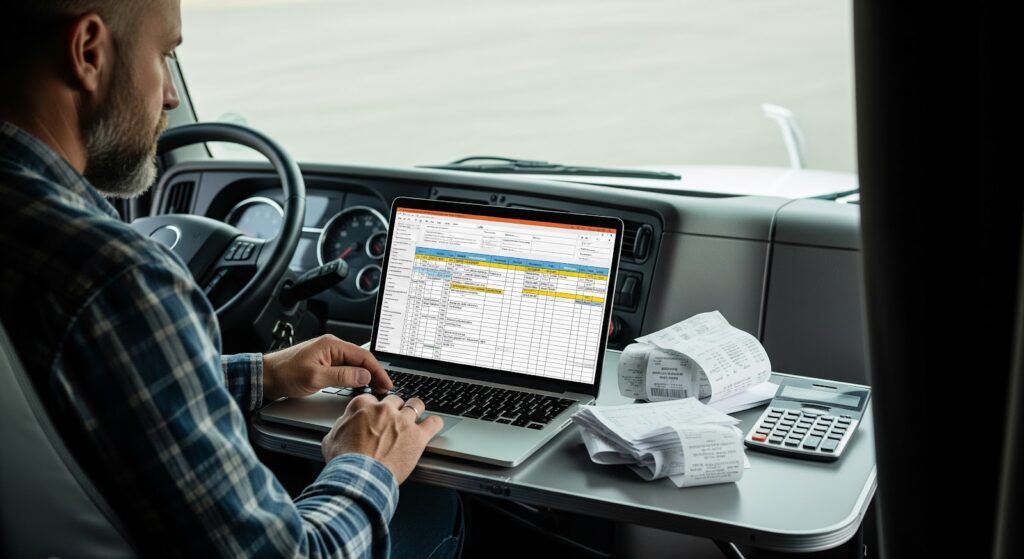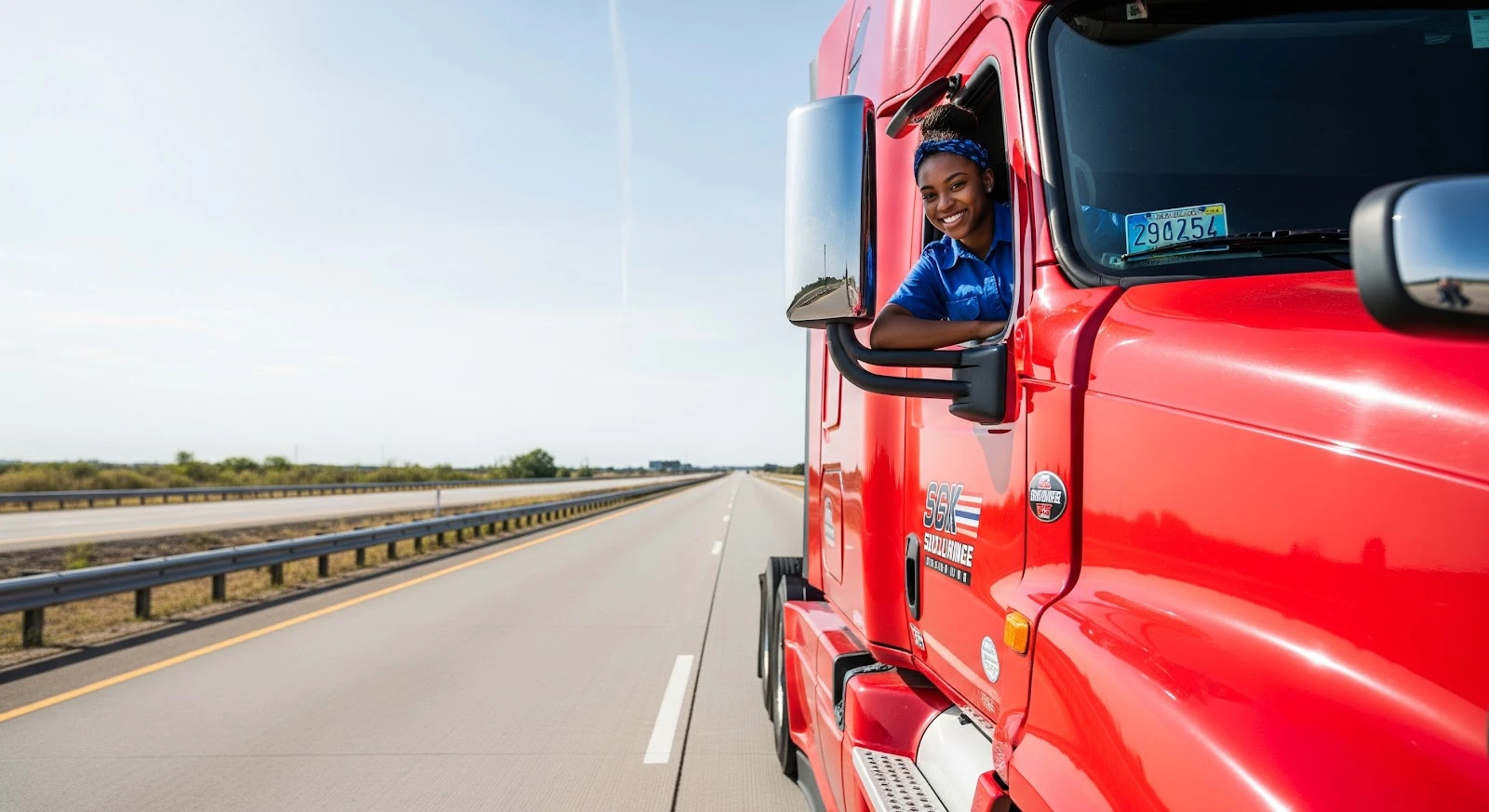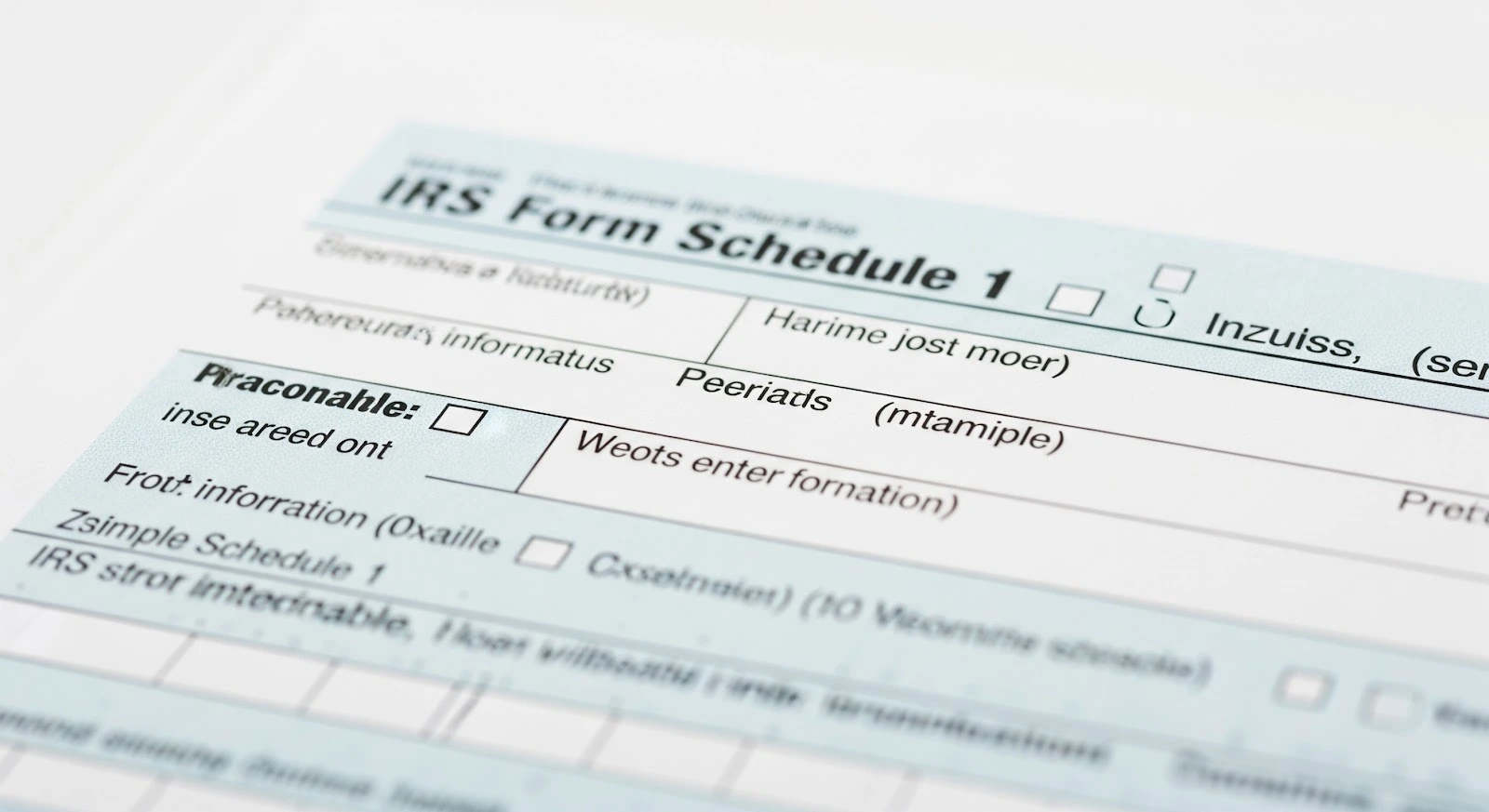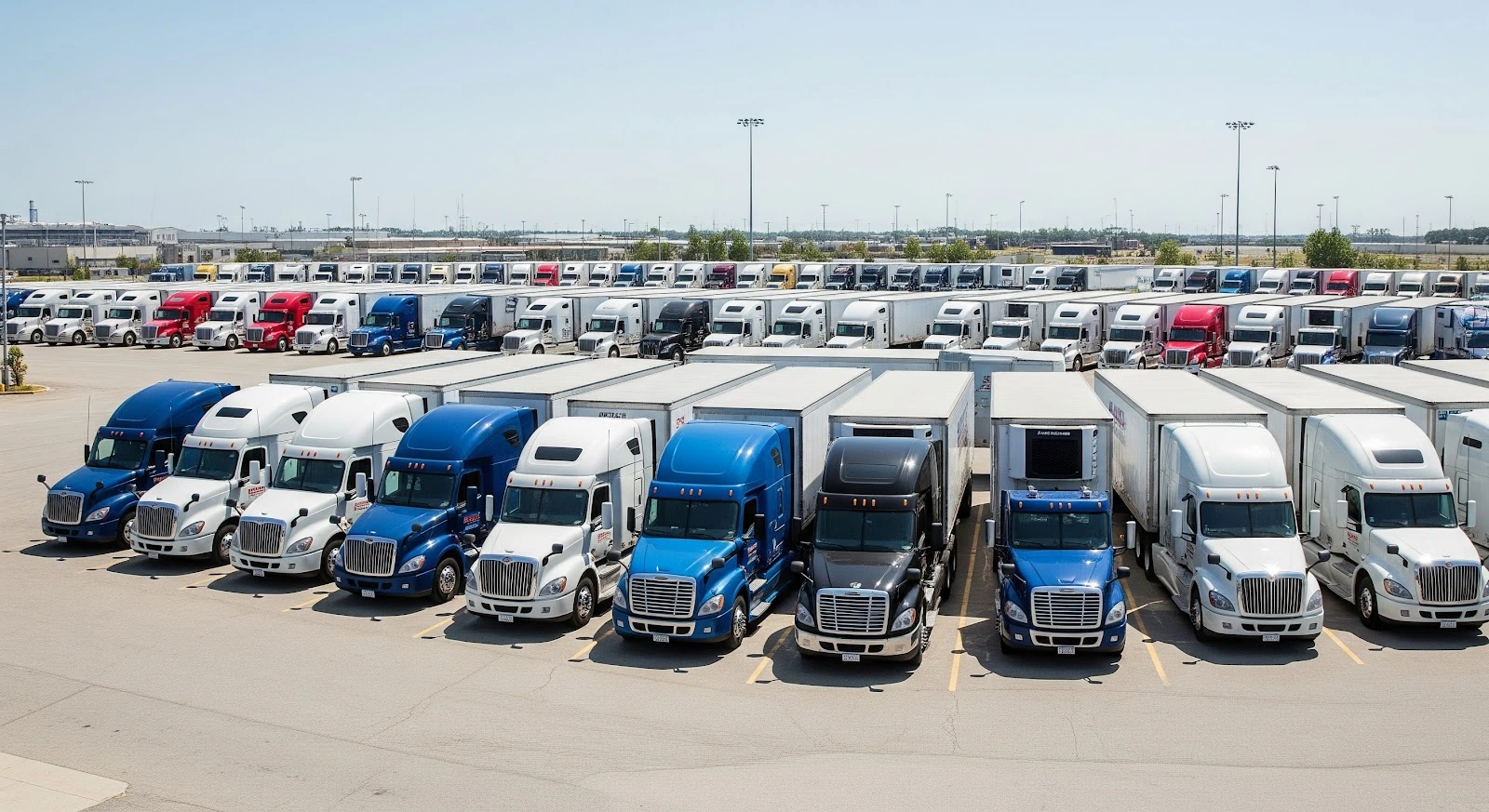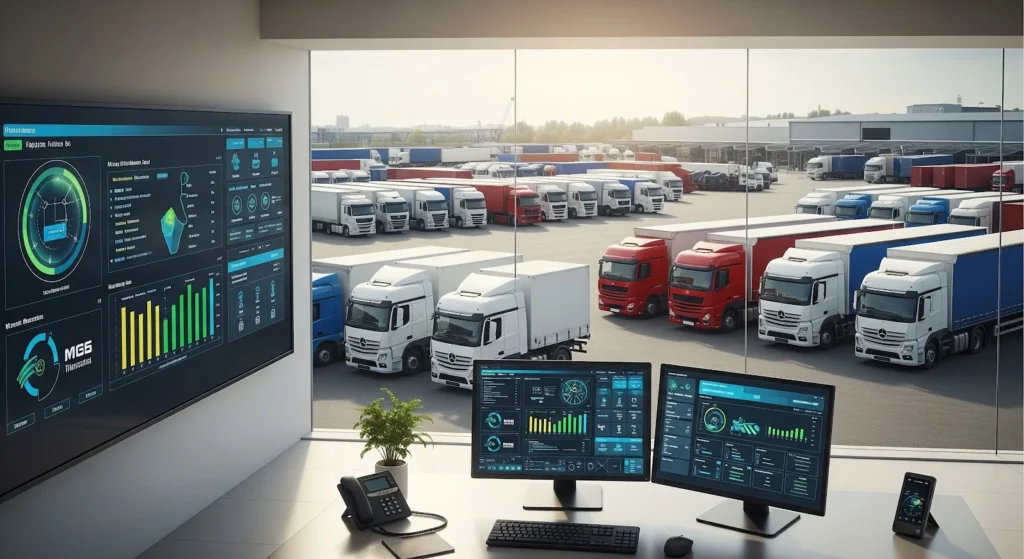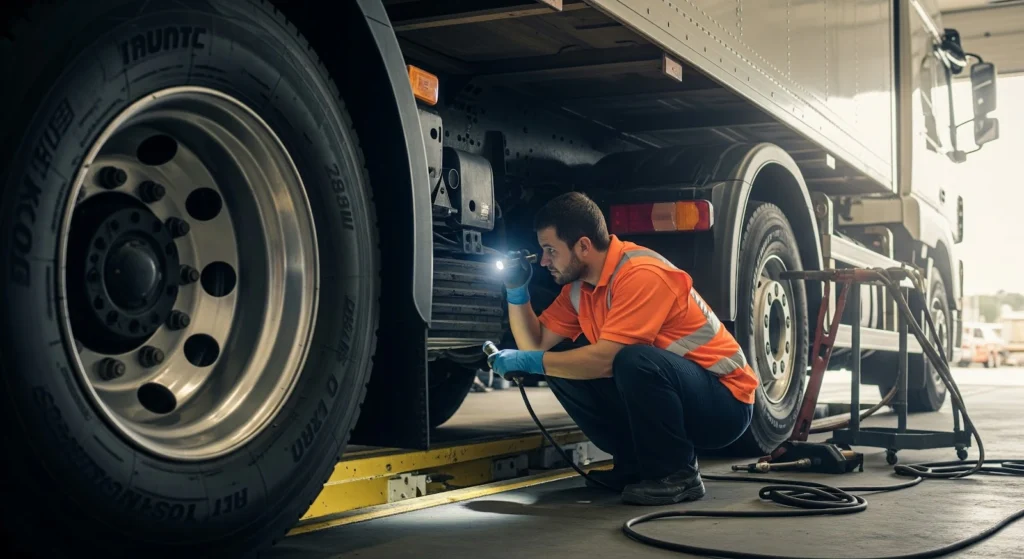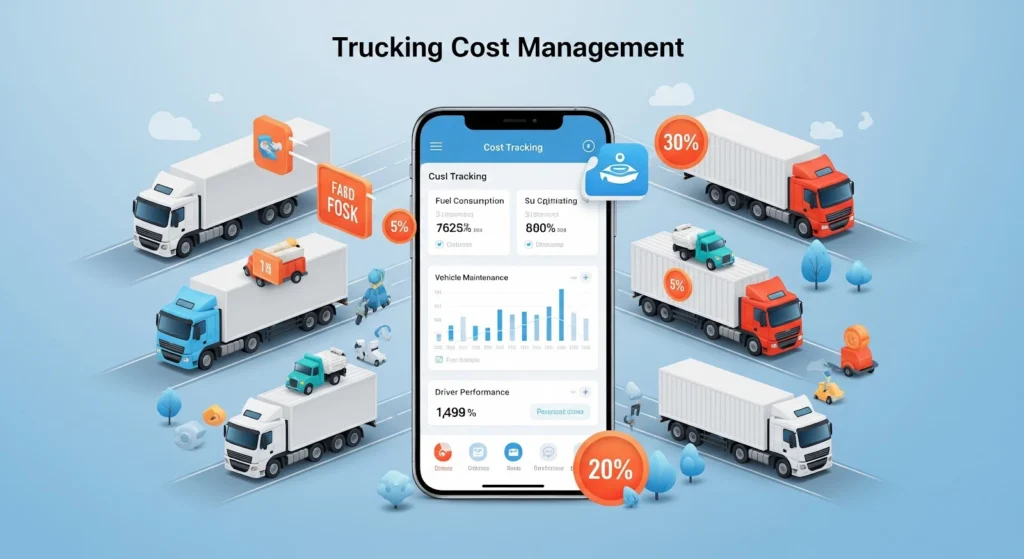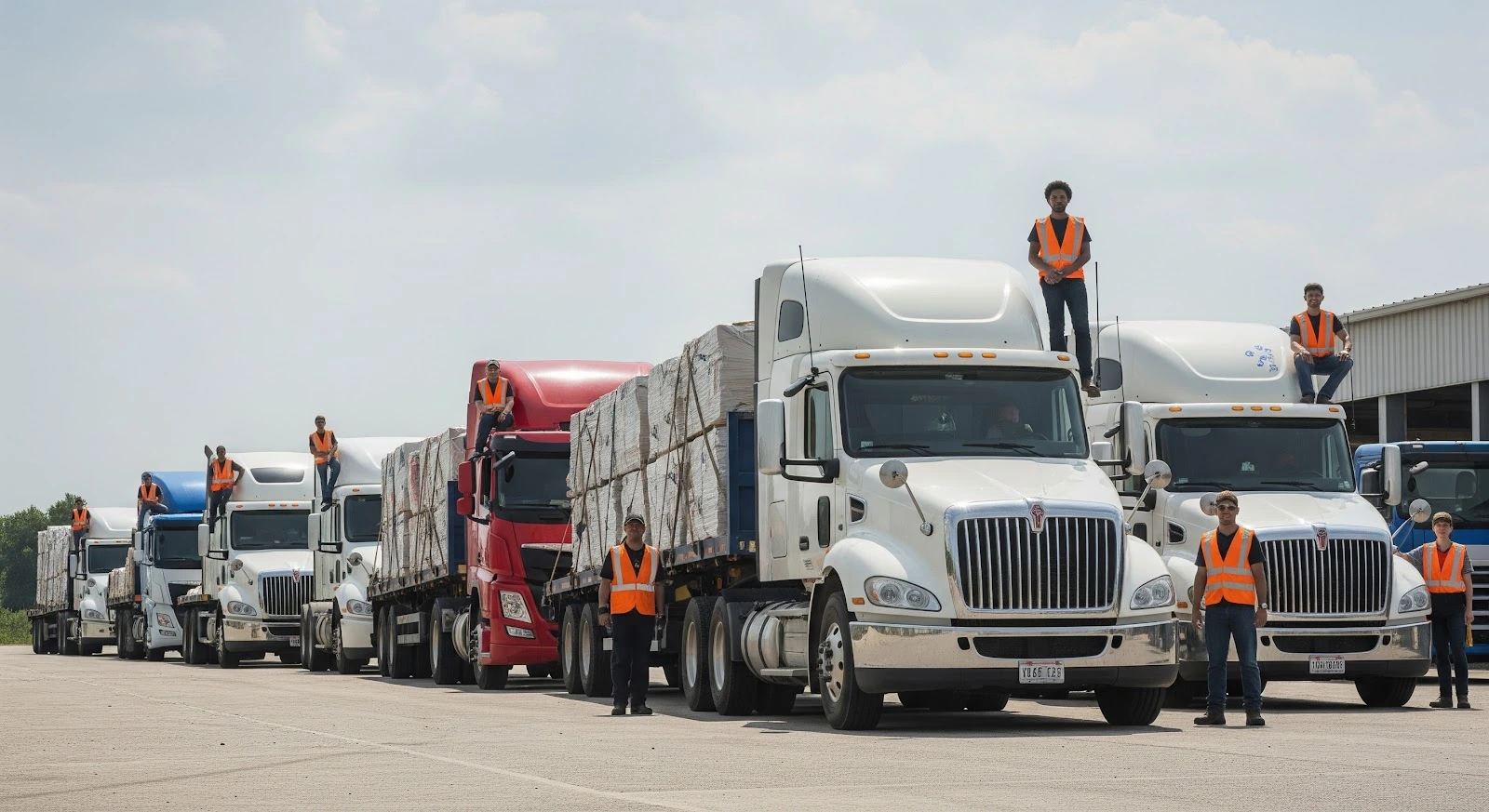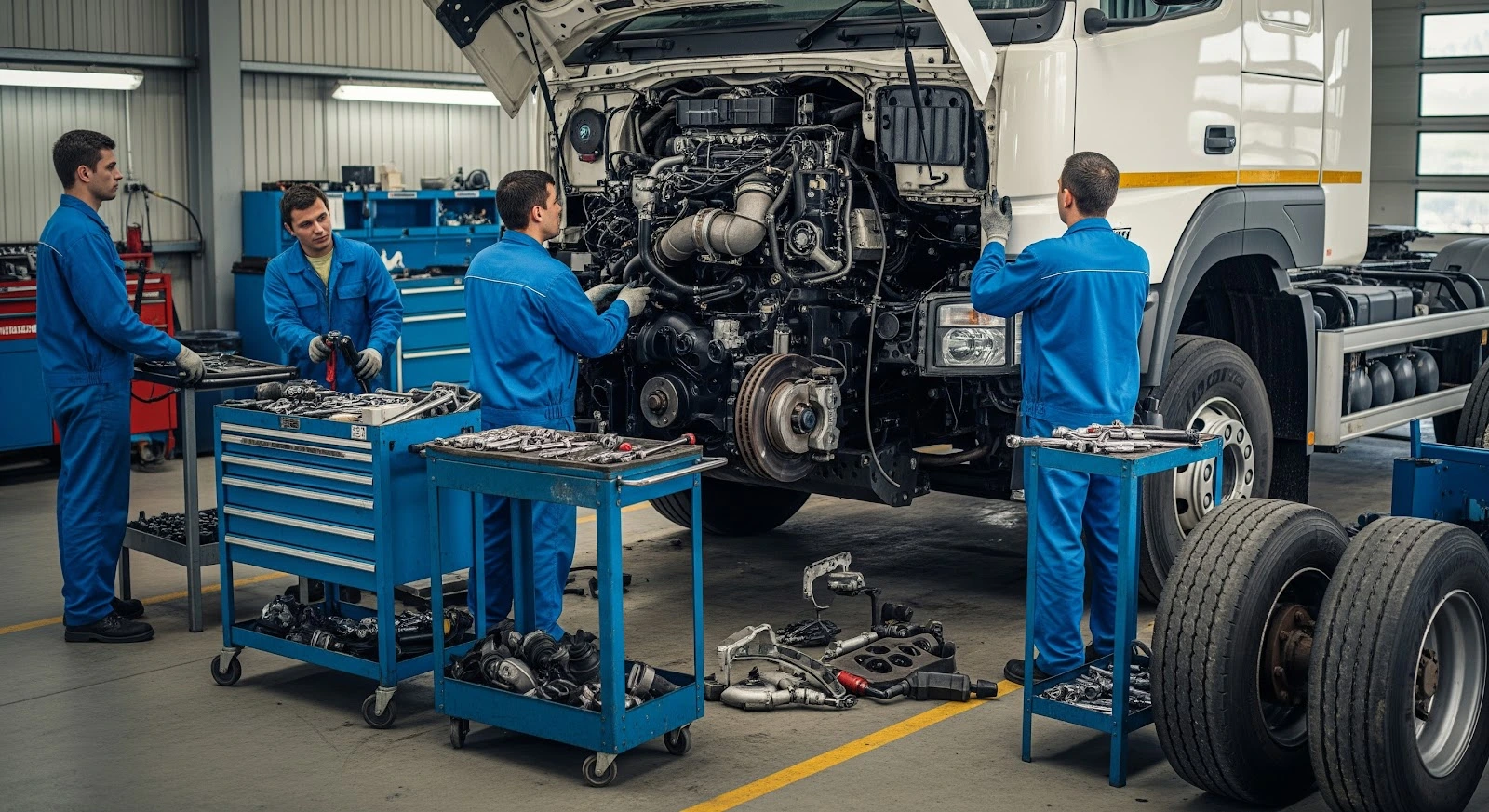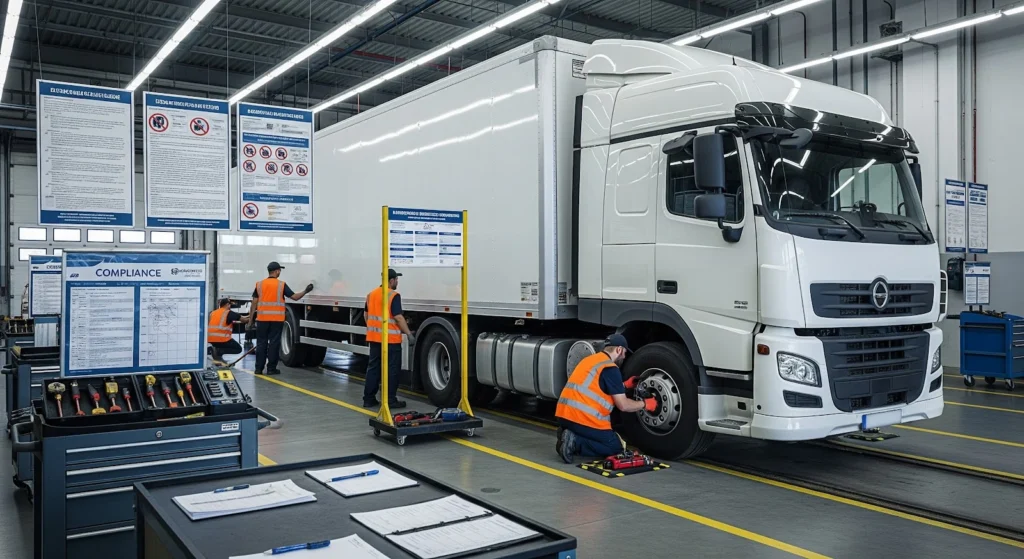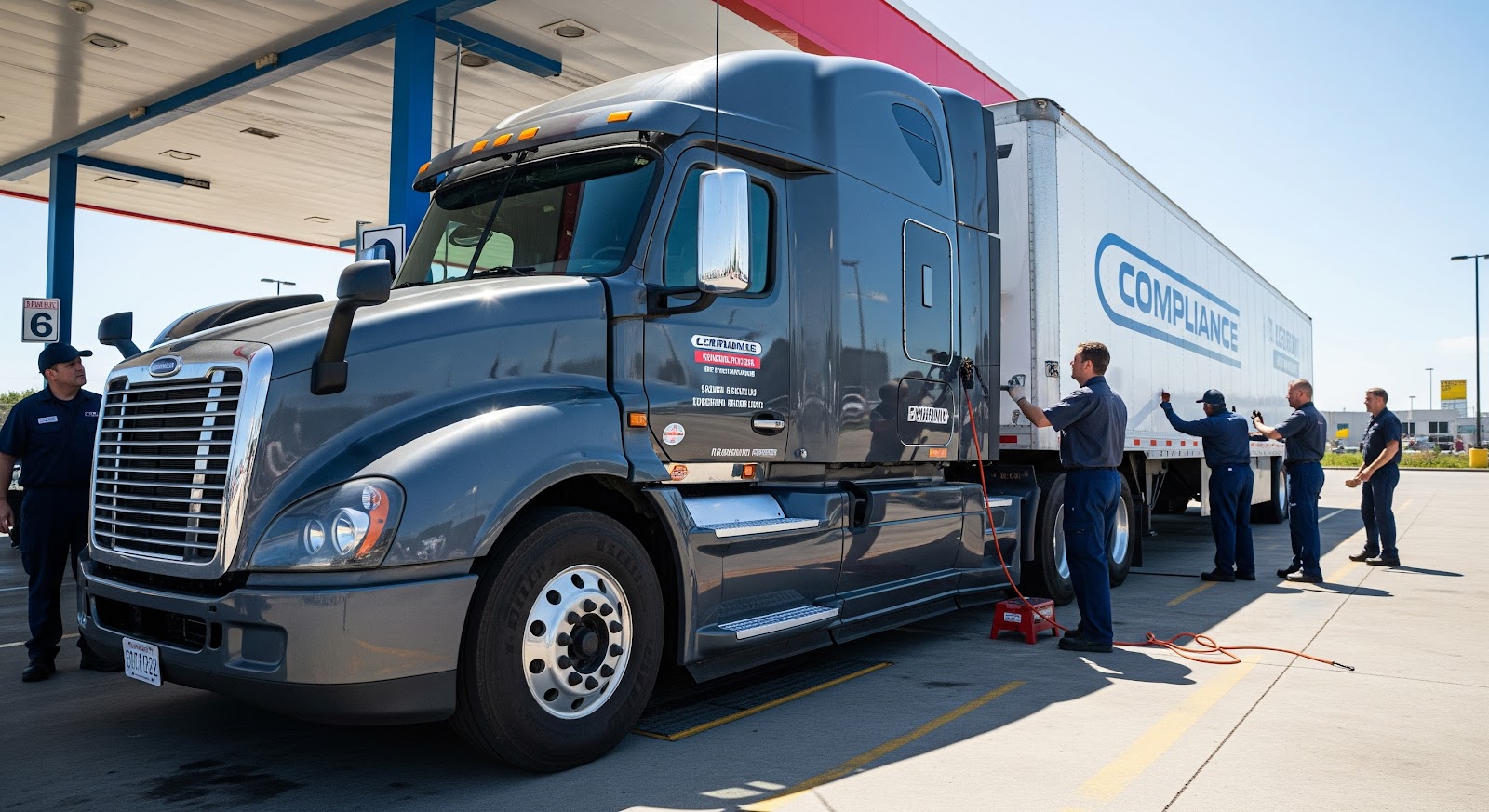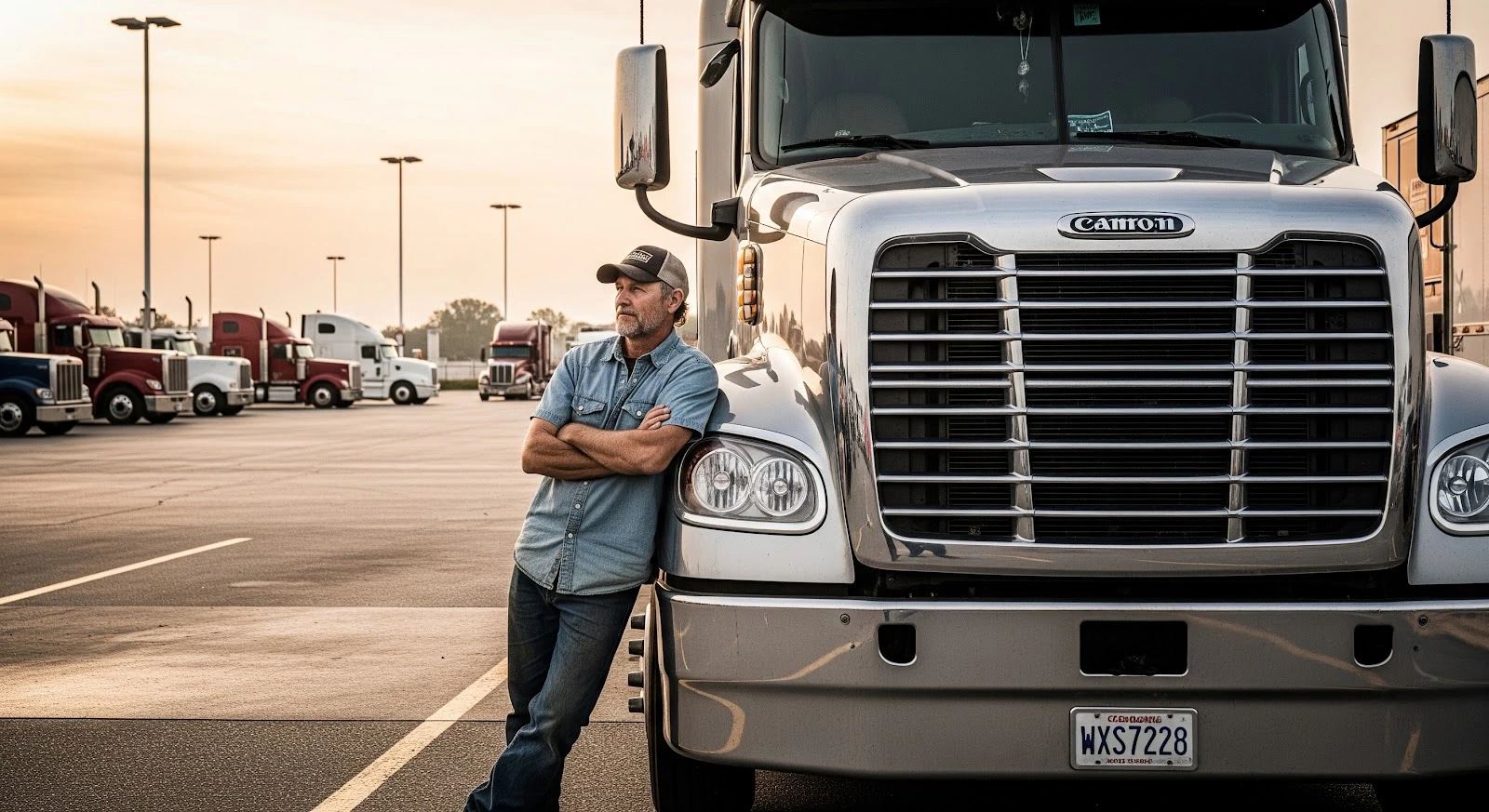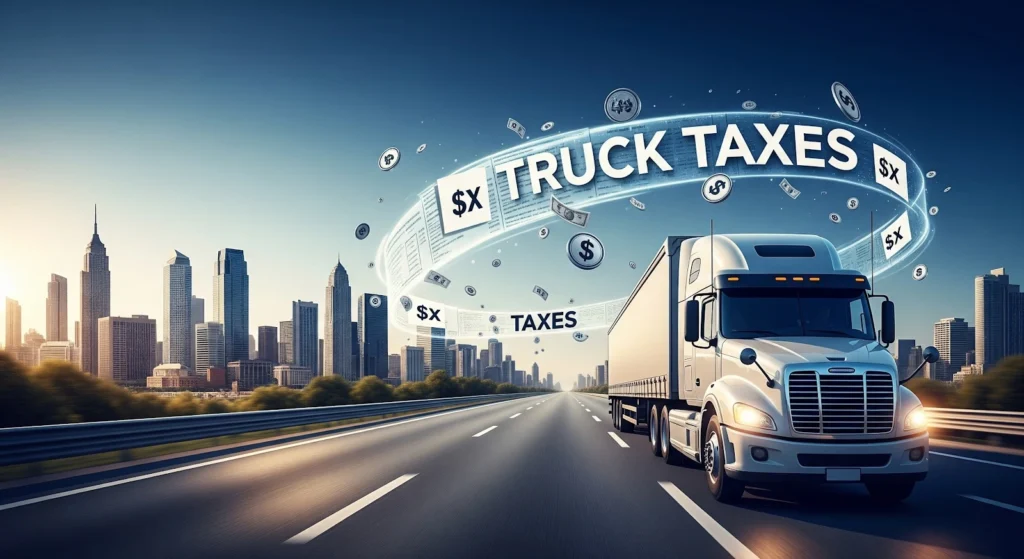
Commercial truck fleet insurance is a specialized type of insurance policy designed to cover multiple trucks under a single, centralized policy. Instead of managing individual policies for each vehicle, fleet insurance provides streamlined coverage for your entire operation, typically five or more trucks, but some insurers offer options for smaller fleets too.
Fleet policies are customizable to suit your business needs, covering a range of vehicles, drivers, and cargo types. Whether you’re operating regional delivery vans or long-haul big rigs, fleet insurance offers a comprehensive, scalable solution that can reduce administrative headaches and lower overall premiums compared to managing separate policies.
In this guide, we’ll walk through everything you need to know about commercial truck fleet insurance, from core coverage types and cost factors to compliance requirements and money-saving tips, so you can make informed decisions that protect your business and support its growth.
What Is Commercial Truck Fleet Insurance?
Commercial truck fleet insurance is a specialized insurance policy designed to cover multiple commercial vehicles, typically five or more, under one comprehensive plan. Instead of insuring each truck separately, fleet insurance provides a unified policy that includes liability, physical damage, and other essential protections for all vehicles in the fleet. This streamlines the insurance process, simplifies billing and renewals, and often results in better pricing and broader coverage for businesses that manage multiple trucks.
The scope of commercial truck fleet insurance is wide, offering customizable coverage that fits the specific operational needs of a business. Whether your fleet consists of long-haul semis, box trucks, or local delivery vehicles, this type of policy can be tailored to your routes, cargo types, and driver profiles. It’s designed to reduce risk exposure across the entire operation, ensuring that your business can remain compliant and financially protected in the event of an accident, breakdown, or liability claim.
How It Differs from Individual Commercial Truck Insurance
While both fleet insurance and individual truck insurance provide coverage for vehicles used in business operations, there are important differences in how each is structured and managed. Individual commercial truck insurance covers one vehicle at a time, which means each truck in your fleet would require its own separate policy. This can become costly, time-consuming, and difficult to manage, especially as your fleet grows.
In contrast, commercial truck fleet insurance consolidates all vehicles under one policy, making it far easier to manage renewals, billing, and claims. It allows you to adjust the policy as trucks are added or removed from the fleet, or as drivers are hired or reassigned. Additionally, insurers typically assess risk across the entire fleet rather than each vehicle individually. This often leads to lower overall premiums and a more efficient insurance strategy for businesses operating multiple trucks.
Fleet insurance is especially valuable for companies with high vehicle turnover or complex logistics operations. The ability to make quick adjustments without needing to cancel and reissue separate policies provides a major operational advantage.
Types of Businesses That Typically Need Fleet Insurance
A wide range of businesses rely on commercial truck fleet insurance to protect their vehicles, drivers, and cargo. Trucking companies and freight carriers are among the most common users, especially those involved in regional or long-haul transport. These businesses often operate large numbers of vehicles and require robust, flexible insurance to cover various cargo types and driving distances.
Logistics providers and supply chain companies also benefit from fleet insurance, as do last-mile delivery services and couriers that operate multiple vans or trucks. Leasing companies and businesses that rent out commercial trucks need fleet insurance to cover the vehicles while they’re in use by customers or contractors.
Construction, landscaping, and utility companies often operate specialized service vehicles and equipment, making fleet insurance essential for protecting their operational assets. Agricultural businesses with transport trucks for produce or livestock, as well as municipalities with fleets for sanitation or public works, also rely heavily on this type of policy.
In general, any business that owns or operates more than a few commercial vehicles on a regular basis should consider fleet insurance to ensure comprehensive coverage, operational flexibility, and long-term cost efficiency.
Who Needs Commercial Truck Fleet Insurance?
Commercial truck fleet insurance isn’t just for massive carriers with hundreds of trucks, it’s a vital tool for any business operating multiple commercial vehicles, regardless of size or industry. If your livelihood depends on keeping several trucks on the road, a fleet policy can protect your assets, simplify your administrative workload, and keep you compliant with federal and state regulations.
Fleet owners and operators, such as trucking companies and freight carriers, are the most common users of commercial truck fleet insurance. These businesses often manage vehicles that travel long distances and haul valuable cargo, making them more exposed to accidents, breakdowns, and liability claims. A single comprehensive policy allows them to protect all their trucks, drivers, and loads under one umbrella, making management far more efficient.
Leasing companies also require this type of insurance. When you lease out commercial trucks to other businesses or independent drivers, you still maintain a financial interest in those vehicles. Fleet insurance ensures that your assets are covered whether they’re in your lot, in transit, or in the hands of a lessee, protecting against damage, theft, or liability claims that could otherwise cost thousands of dollars.
Logistics and delivery service providers, from large national parcel carriers to regional freight brokers, also depend heavily on fleet insurance. With vehicles constantly moving goods between warehouses, distribution centers, and customers, these companies face high operational risks. A fleet policy makes it easier to manage coverage for multiple routes, vehicle types, and driver schedules without juggling dozens of separate policies.
Even owner-operators managing multiple vehicles can benefit from commercial truck fleet insurance. If you’ve grown from running your own rig to managing several trucks and drivers, individual policies quickly become expensive and time-consuming. Switching to a fleet policy streamlines the process, allows for easier scaling as you add trucks, and may reduce your per-vehicle insurance costs.
In short, any business that regularly operates more than a couple of trucks, whether for freight hauling, deliveries, leasing, or specialized services, should consider fleet insurance as a cost-effective way to safeguard vehicles, cargo, and business operations.
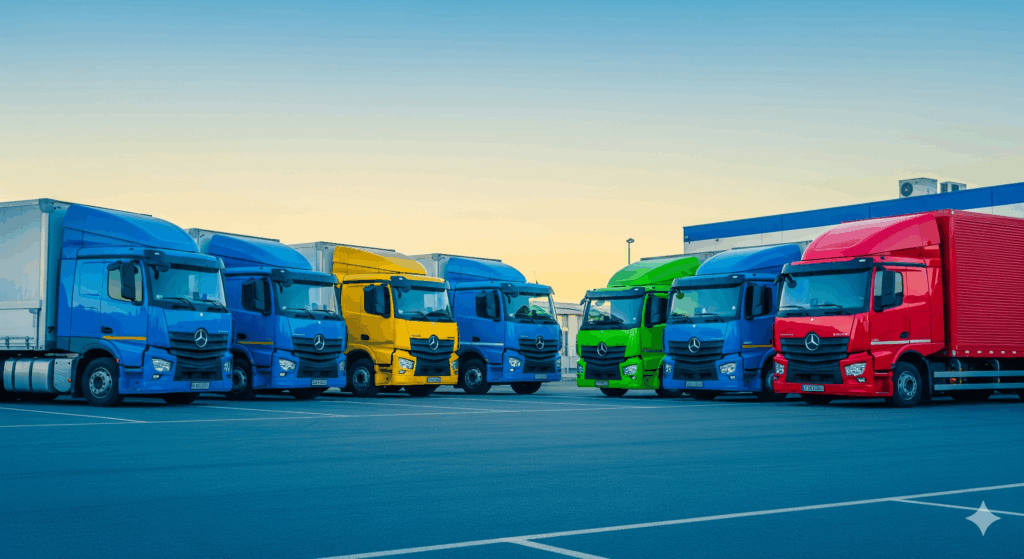
Core Coverages Included in Fleet Insurance
A commercial truck fleet insurance policy isn’t just a single type of coverage, it’s a package of protections designed to keep your business financially secure in a wide range of situations. While the exact details vary depending on your provider and business needs, here are the most common and essential coverages included in a fleet policy.
Liability Insurance (Bodily Injury & Property Damage)
Liability coverage is the foundation of any commercial truck policy and is required by law for all motor carriers. It protects your business if one of your drivers is at fault in an accident that causes injury to another person or damage to their property. Bodily injury liability pays for things like medical expenses, lost wages, and legal fees, while property damage liability covers repairs or replacement for the damaged property. Without this protection, a single accident could result in a lawsuit or settlement that could cripple your business financially.
Physical Damage Coverage (Collision and Comprehensive)
Physical damage coverage protects your own vehicles from costly repairs or replacement. Collision coverage applies if your truck is damaged in an accident with another vehicle or object. Comprehensive coverage steps in for non-collision incidents such as fire, theft, vandalism, hail, or other weather-related damage. Since trucks are high-value assets and essential to your operations, this coverage ensures you can get back on the road quickly without a devastating out-of-pocket expense.
Cargo Insurance
If your trucks are hauling goods, cargo insurance is a must. It protects the value of the freight you’re transporting in case of theft, damage, or loss during transit. Different types of cargo have different risk levels, so policies can be tailored to your specific freight. Whether you’re carrying perishable goods, electronics, or raw materials, cargo insurance helps protect your business from claims and keeps customers confident in your services.
Uninsured/Underinsured Motorist Coverage
Even though insurance is required, not every driver on the road carries adequate coverage. If one of your trucks is involved in an accident caused by an uninsured or underinsured driver, this coverage pays for damages and medical costs that the at-fault driver’s policy cannot cover. It ensures your business isn’t left paying the bill when another party fails to meet their legal responsibilities.
Medical Payments & Personal Injury Protection (PIP)
Medical payments coverage or personal injury protection (depending on your state) provides for medical expenses for you and your drivers after an accident, regardless of who is at fault. In some states, PIP can also cover lost wages and essential services while the injured person recovers. For fleets, this coverage is crucial in helping employees get back to work faster and reducing the financial strain of injuries.
Trailer Interchange Insurance
If your business operates in a way that requires the use of non-owned trailers, common in freight hauling and container transport, you’ll need trailer interchange coverage. It protects you when you’re legally responsible for damage to a trailer that is in your possession under a trailer interchange agreement. This includes damage caused by collision, fire, theft, explosion, or vandalism.
General Liability Insurance
Separate from auto liability, general liability coverage protects your business from claims of bodily injury or property damage that occur during normal business operations but are not directly related to truck accidents. This could include injuries to visitors at your business premises, damage caused while loading or unloading, or accidental damage at a client’s property. It’s a broad safeguard against the unexpected situations that can arise in day-to-day operations.
Together, these coverages form the backbone of a solid commercial truck fleet insurance policy. By combining them into a single, customized plan, you can ensure your entire operation, vehicles, drivers, cargo, and business, is protected from multiple angles.
How to Choose the Right Fleet Insurance Provider
Selecting the right fleet insurance provider is one of the most important business decisions you’ll make as a fleet owner or operator. The right partner will not only offer competitive rates but also understand the unique risks of your industry, provide excellent service, and help you keep your operations running smoothly. Here’s what to consider when making your choice.
Key Questions to Ask When Comparing Insurers
Before committing to a policy, ask potential providers the right questions:
- What specific coverages are included in the base policy, and which are optional add-ons?
- How quickly do they process claims?
- Are there limits or exclusions that could leave you vulnerable?
- Can you easily add or remove vehicles mid-term?
- How do they handle drivers with different experience levels or accident histories?
A thorough Q&A up front can help you avoid surprises later.
Importance of Industry Experience
Not all insurers understand the complexities of trucking and fleet management. Providers with experience in the transportation sector know the regulations you must follow, the risks you face, and the seasonal challenges that can affect operations. They can recommend coverage options tailored for long-haul trucking, local delivery, specialized cargo, or mixed-use fleets. Choosing an insurer without this industry insight can lead to gaps in protection or policies that don’t align with your real-world needs.
Customizable vs. One-Size-Fits-All Policies
Every fleet is different, so your insurance should be too. A one-size-fits-all policy might seem convenient, but it often includes unnecessary coverages, or worse, leaves out critical protections. A good provider will work with you to design a plan that matches your vehicle types, cargo, routes, and budget. This flexibility can make a big difference, especially for fleets that expand, downsize, or change their operations frequently.
Customer Service and Claims Process
When an accident or claim happens, you need an insurer that responds quickly and communicates clearly. Look for providers with strong reputations for customer service and claims handling. Ask how to file a claim, what documentation is required, and how long settlements typically take. An efficient claims process can mean the difference between having trucks sidelined for weeks and getting back on the road in days.
Technology Integrations (e.g., Fleet Management Systems)
Many modern insurers now integrate with fleet management and telematics systems. These integrations can streamline reporting, improve safety monitoring, and even lower premiums by proving your commitment to safe operations. If your fleet uses GPS tracking, electronic logging devices (ELDs), or route optimization software, check whether your insurer can connect to these tools. This not only makes administration easier but can also provide valuable data for claims and risk management.
Choosing the right fleet insurance provider isn’t just about the lowest price, it’s about finding a partner who understands your business, supports your growth, and stands by you when challenges arise. Taking the time to evaluate these factors will help ensure you get a policy that delivers long-term value and peace of mind.
Legal & Compliance Considerations
Fleet insurance isn’t just a smart business decision, it’s also a legal requirement for most commercial carriers. Whether you operate locally or across state lines, there are regulations you must meet to stay compliant and avoid costly penalties. Understanding these requirements ensures that your fleet remains road-legal, avoids fines, and continues to operate without interruption.
Federal Motor Carrier Safety Administration (FMCSA) Requirements
The FMCSA sets the standards for commercial vehicle operations in the United States, including insurance requirements for interstate carriers. If your fleet hauls cargo across state lines or transports certain types of goods, you must meet FMCSA’s minimum liability insurance limits. These limits vary based on the type of freight you carry, general freight, hazardous materials, passengers, etc., and can range from $750,000 to $5 million in liability coverage. Your insurance provider must also file the appropriate forms (such as Form MCS-90) with the FMCSA to prove compliance.
DOT Compliance and Minimum Coverage Thresholds
The Department of Transportation (DOT) enforces safety and operational standards for all commercial motor vehicles. Part of DOT compliance involves maintaining minimum insurance coverage at all times. This coverage protects the public in case of accidents involving your fleet. Falling below these thresholds, even temporarily, can lead to fines, suspension of your operating authority, or loss of contracts. Staying on top of your policy renewals and ensuring continuous coverage is essential for DOT compliance.
State-Specific Insurance Mandates
While FMCSA and DOT rules apply at the federal level, each state also has its own insurance requirements. These may include different minimum liability limits, cargo coverage rules, or filing requirements for intrastate carriers. For example, a trucking company operating solely within one state might be subject to higher minimum coverage levels or specific endorsements not required elsewhere. It’s important to work with an insurance provider familiar with the regulations in every state where you operate, especially if your routes frequently cross state lines.
Certificates of Insurance (COI) for Leasing or Contracts
In the trucking industry, many business relationships, such as freight contracts, leasing agreements, and shipper partnerships, require proof of insurance in the form of a Certificate of Insurance (COI). A COI verifies your coverage limits, policy dates, and the types of protection you carry. Without an up-to-date COI, you may not be able to sign a new contract, pick up a load, or lease equipment. Having an insurer that can quickly issue COIs upon request is crucial to keeping your business moving without delays.
Meeting these legal and compliance requirements is non-negotiable for any fleet. Failing to comply can lead to financial penalties, the suspension of operating authority, and even the loss of business relationships. A knowledgeable insurance provider can help you navigate these rules, ensure proper filings, and keep your fleet in full compliance at all times.

